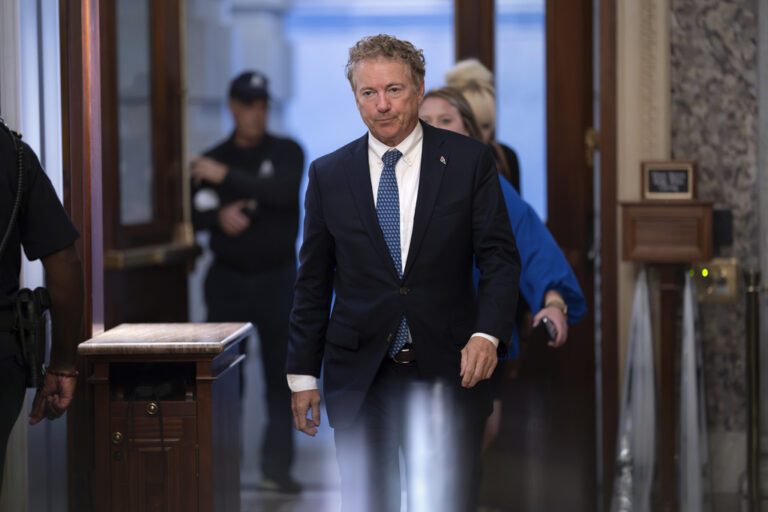Senate Moves to Repeal Trump’s Tariffs Amid Economic Concerns
The U.S. Senate is poised to advance a series of resolutions aimed at eliminating President Trump’s tariffs on over 100 nations, sparked by rising inflation, disappointing job reports, and turmoil in the agricultural sector. However, a significant obstacle remains: Speaker Mike Johnson’s recent modifications to House rules prevent lawmakers from advancing these measures in the lower chamber.
Tariffs Under Fire: A Bipartisan Concern
Several Republican lawmakers, particularly those from the Midwest and competitive districts, have voiced concerns regarding the tariffs. Notable figures, including Senator Rand Paul and Senator Mitch McConnell, have expressed support for repealing these import taxes. This tariff policy represents the largest increase in import taxes since World War II, raising significant apprehensions among various economic sectors.
Key Points:
- Bipartisan Support: GOP members across various states, especially Kentucky and Alaska, are advocating against the tariffs.
- Historical Context: The tariffs were instituted during Trump’s administration as a unilateral measure to bolster domestic economics but have faced backlash for adversely impacting certain industries.
The House Rule Change: Protecting Power?
In an effort to maintain Trump’s authority to impose these tariffs, Speaker Johnson and his GOP colleagues implemented a rule change in April that bars rank-and-file members from proposing resolutions to challenge these import taxes. Critics argue that this move aims to shield vulnerable Republicans from taking a definitive stance on the president’s substantial tax hikes.
Details of the Rule Change:
- Effective Until 2025: The previous rule prohibiting anti-tariff resolutions was set to last until September 30, 2025, but an extension passed on September 16 means lawmakers won’t be able to introduce challenges until January at the earliest.
- Potential for Further Extensions: The House could easily prolong this embargo again if desired.
GOP Senators Break from Trump
While the House remains under restrictive rules, a faction of Republican senators is defying the party line by backing resolutions to repeal the tariffs. Senators including McConnell and Paul have consistently opposed Trump’s tariffs, particularly those affecting sectors reliant on international trade.
Recent Senate Actions
- Ending Brazil Tariffs: On Tuesday, the Senate successfully voted to eliminate the 50 percent tariffs on Brazil, which economists argue have led to significant price hikes in beef, coffee, and other essential goods.
- Support Grows: Five Republican senators have now voted to repeal these tariffs, reflecting a growing division within the party.
A Critical Examination by McConnell
In a pointed statement, Senator McConnell criticized protectionist policies within his party, stressing that tariffs only lead to higher costs for American consumers and businesses. He specifically highlighted that:
“Tariffs make both building and buying in America more expensive. The economic harms of trade wars are not the exception to history, but the rule.”
This sentiment underscores the argument that such tariffs do not effectively serve economic interests and often result in wider repercussions for consumers and industries.
Upcoming Votes and Legal Challenges
As the Senate prepares to tackle resolutions aimed at repealing further tariffs, including those imposed on Canada, attention is also turning to a critical legal battle. The Supreme Court is set to hear arguments regarding the legality of Trump’s extensive tariff powers, which have already faced scrutiny and been deemed illegal by federal courts.
Key Upcoming Votes:
- Canada Tariffs: A resolution to repeal recently increased tariffs on Canada will be up for vote shortly.
- Broad Tariff Repeal: Another significant resolution addresses Trump’s sweeping "Liberation Day" tariffs impacting over 100 countries.
External Links for Further Reading:
In conclusion, as tariffs continue to be a contentious topic within Congress, the interplay between economic realities and political strategy remains a focal point. With bipartisan support for tariff repeal growing, the coming weeks may prove pivotal in shaping U.S. trade policy and addressing pressing economic challenges.


